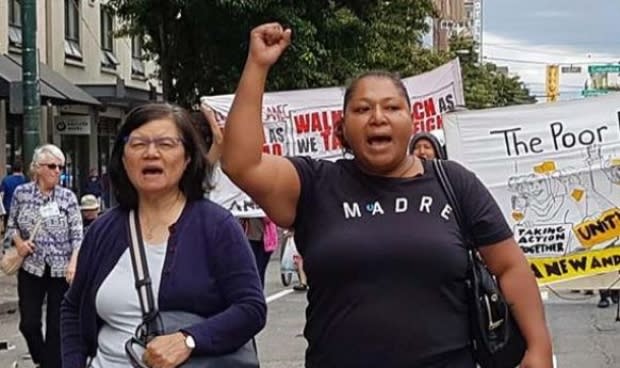Single mother of 3 calls for better services for Indigenous families on DTES
Robin Raweater is raising three daughters on Vancouver's Downtown Eastside and says doing so would be a lot easier if she could find somewhere they could all live.
Raweater, an Indigenous activist and co-chair of the Downtown Eastside Women's Centre's board of directors, has lived in the neighbourhood for 30 years and says while there are several organizations providing support in the area, there are still not enough resources aimed at helping Indigenous families.
One of the main barriers preventing Indigenous families from escaping poverty is access to affordable housing and Raweater told Stephen Quinn, the host of CBC's The Early Edition, "it's extremely difficult" to find it in Vancouver as a single mother.
"We need more family units," said Raweater, who is currently living in a shelter while she waits for B.C. Housing to find somewhere she and her girls can move into. She estimates the wait could take up to 18 months.
This is daunting for Raweater who recently had her children returned to her from foster care.
"Social workers come in and they see that you have no food in your fridge then that's grounds for apprehension," said Raweater. "Kids are getting taken away, because they don't have adequate proper housing ... it's horrible and it's not fair."
Raweater, who is Blackfoot from the Siksika Nation, was in and out of foster homes as a child and her own mother was forced into a residential school.
Separating Indigenous families, said Raweater, has caused "trauma that gets passed down from generation to generation" and she said service providers should be better equipped to help people who have been traumatized.

'Entrenched in trauma'
"They need more cultural sensitivity training," said Raweater, "Our people are so hurt, they're so entrenched in trauma right now, and there's not proper supports and services to help heal."
According to Raweater, the opioid crisis is disproportionately impacting Indigenous people because they are self-medicating to manage this trauma.
She also believes frontline workers on the Downtown Eastside should have access to trauma support because of what they see and experience on the job.
"They need to go for the trauma therapy so they're better able to help," said Raweater, "Because you're getting traumatized people helping traumatized people."
Research shows Indigenous people are disproportionately affected by homelessness and the opioid crisis and Indigenous children are far more likely to be apprehended by social services.
Raweater said more healing and wellness centres in the neighbourhood could help First Nations residents suffering from trauma and addiction.
"Indigenous people are First Nations, but we are the last on the list ... especially here in the Downtown Eastside," said Raweater. "We're trying to rise right now ... we wish we could be, and we should be, better supported."
To hear the complete interview with Robin Raweater click on the audio link below:

